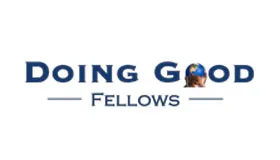Doing Good Fellows: The New Paradigm of Volunteering

If you ever had a desire to give back by volunteering or doing service, but never followed through because of a lack of time or energy, you will most likely appreciate the work of Doing Good Fellows. The young nonprofit organization addresses the discrepancy between the amount of “good” people want to do and the amount of “good” people actually do, recognizing the the vast amount of potential for social impact that remains static because of the disconnect between individuals and vehicles for change. Doing Good reduces this disconnect, providing a virtual forum for giving back by connecting individuals with organizations and catalyzing change by disseminating free-of-cost expertise and business networks.We connected with co-founders Sajid Shariff, Palak Dalal, and Revathy Muralidharan to learn more about their organization.
“It’s a nonprofit service that is catered to meeting the needs of busy people who don’t have the time or energy to actually do good stuff sometimes,” Palak Dalal told us. “We’re trying to form a bridge between the nonprofits in India and the accomplished people in India that actually want to do good.”

Working a full time job makes time itself especially valuable. The more time needed to travel to a particular organization, the greater the opportunity cost of volunteering, and the less likely one is likely to engage. By putting its services online, Doing Good Fellows eliminates the need for travel and makes volunteering more feasible for everyone. “The whole idea of doing this online is to break the distance barrier for anyone who wants to do good,” explained Revathy Muralidharan. “It’s almost impossible in today’s world to get together in one place and meet, go to an NGO, find out what they want from you and how you can be a resource to them. What we’re trying to do is to provide that to you in the touch of a click.”
An interested individual can apply online by filling out his or her area of expertise, what issue they want to target (poverty, health, education, human rights, public policy, or any of the above) and what service they want to provide. These services can be anything from the more traditional volunteer work focused on a specific project within the NGO, to providing their expertise or skillset remotely to an NGO that might need it. Doing Good Fellows takes these preferences and matches candidates with an NGO in need of their specific skillset or desired service. “There is no clear set of expertise were looking at but we’re looking for a general trend of a person who has the experience that a nonprofit will look for,” Sajid Shariff explained.

The reason for the loose set of criteria for choosing applicants is the inclusive process of recruiting NGO partners. “We try to be as diverse as possible,” Sajid explained. This diversity allows individuals to be able to able to make a significant impact in an NGO and the greater community they serve regardless of the field in which their experience lies. Once chosen, Doing Good will work with fellows to sensitize them to the work the NGO is doing and the needs of the communities they serve.
“Once we think this person will be committed to some of the questions we ask based on the fellows expertise, network, based on their experience, how many years they have been in the particular area, we will cultivate that fellow before he or she can start serving a nonprofit,” Sajid Shariff explained. By matching fellows with NGOs and nonprofits based on how well they fit the needs of the organization, they minimize inefficiencies that sometimes result from volunteers working in a position that might not exercise their full capacities.
The most unique aspect of the Doing Good approach is that it allows individuals to volunteer regardless of proximity. This minimizes the most common deterring agent – the value of time lost to travel to and from an organization – to create a new paradigm of volunteering. We no longer have to think about volunteering as an activity performed at the physical location where the impact is being created or felt. The same sort of impact can now be created thousands of kilometers away.

Doing Good Fellows has also partnered up with Bridge the Gap to help those fellows who might have materials they want to donate to a nonprofit but lack the means or time to transport it. Bridge the Gap will come to the fellow’s home, pick up the materials, and deliver them to the NGO. “If anyone across any field is willing to donate any materials, any books, clothes, or money, to a certain institution or nonprofit, then Bridge the Gap will collect the stuff from the fellow and drop it off at the nonprofit,” Revathy Muralidharan explained. “This is a company that can help us build an ecosystem around people who want to do good.”
Doing Good Fellows is in its pilot phase right now, having just launched in September of this year. During this initial phase, it will work to perfect the model it has created. “We want to learn as much as possible before we perfect the model so right now were in the mode of speaking to people, speaking to nonprofits, speaking to fellows, finding out what they want, what exactly is the problem that we can serve the best, and what kind of NGO is the best to respond to this,” Sajid Shariff explained.
Once they understand the absolute best way to serve both the fellow and the NGO, Doing Good Fellows plans to seek funding to help them scale up. A company like this operating at scale has the potential to eliminate the immense discrepancy between the amount of people who want to volunteer and the number who actually do. This opportunity gives Doing Good Fellows the potential to stimulate a dramatic increase in volunteer participation and a rise in measurable impact and social change across the country.
Want to become a Fellow?







